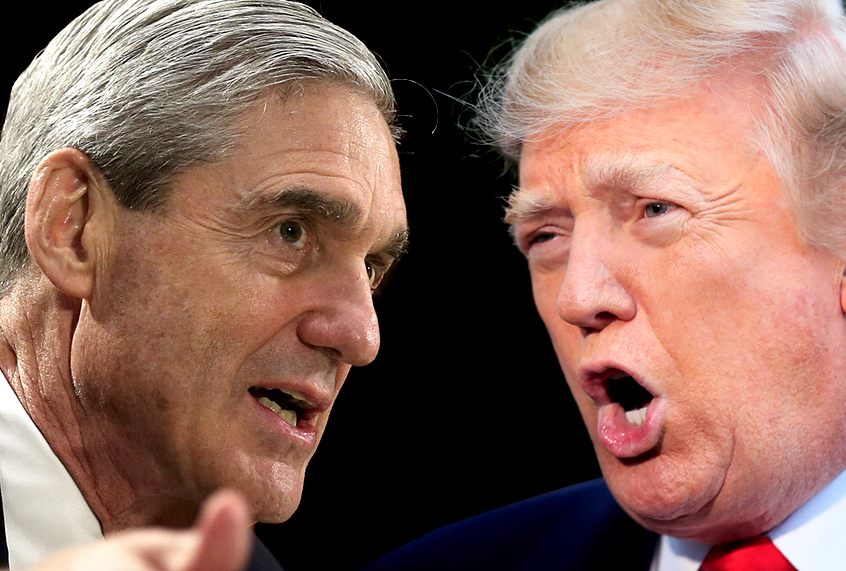It has been revealed that, as of last month, President Donald Trump was only a “subject” of special counsel Robert Mueller’s probe into alleged collusion with Russia during the 2016 election – not a “target.” And Fox News is already spinning this new development as if the ongoing saga has at last concluded with the president’s name cleared.
Wait, Trump is completely off the hook? Or, at the very least, those who alleged there was something fishy about the president’s connections to Russia were wrong?
To be blunt: Definitely not, and probably not, respectively.
What we learned over past week: Mueller is directly engaging with Trump's attys. Wants an intvw w/ POTUS. POTUS wants to do it. But many in Trump camp counseling him against doing so, worry he's just a *subject* now… but could risk becoming a *target,* if he's not careful.
— Robert Costa (@costareports) April 4, 2018
Trump's being investigated by Mueller for multiple crimes. Not being a criminal target of Mueller's means he isn't trying to indict Trump (yet). So any Trumper who gets celebratory about this is unhinged. This is the worst news I've ever heard for any president in my lifetime.
— Scott Dworkin (@funder) April 4, 2018
When someone is the subject of an investigation, it means that he or she has behaved in a manner that could constitute criminal conduct, but investigators believe there is not enough evidence to justify criminal charges, according to The Washington Post. This, in turn means that, while Trump has not yet become a named target of Mueller’s investigation, the special counsel is still in the process of accumulating evidence and could eventually reverse course.
One excerpt from the Post’s story is quite telling here:
The special counsel also told Trump’s lawyers that he is preparing a report about the president’s actions while in office and potential obstruction of justice, according to two people with knowledge of the conversations.
Mueller reiterated the need to interview Trump — both to understand whether he had any corrupt intent to thwart the Russia investigation and to complete this portion of his probe, the people said.
For all intents and purposes, Mueller seems to have decided that he needs to learn more about what Trump knew, when he knew it and whether any of his actions were criminal in nature. Mueller does not yet have enough evidence to prove that Trump committed a crime, but he has also not reached the point where he has decided to stop probing the president’s actions.
This appears to have Trump’s advisers worried, according to the Post. Although both Trump and some of his advisers have insisted that Mueller’s labeling of Trump as a subject means the president is unlikely to find himself in any legal hot water, other members of his political team have noted that subjects of investigations frequently do become indicted targets. They also pointed out that Mueller has made it clear he wants to interview Trump — and his decision to write up reports about the president all but requires him to do so — which would set him up for serious legal ramifications if he does not tell the truth under oath.
In fact, one person close to the discussions from Mueller’s investigation told the Post: “They’ve said they want to write a report on this — to answer the public’s questions — and they need the president’s interview as the last step.”
There is another dimension to Mueller’s decision not to designate Trump as a target of his investigation — one that exists specifically because he is president. As Josh Gerstein of Politico explained:
In Trump’s case, Mueller’s reported concession that Trump isn’t a target of the investigation may mean even less than in a more typical probe. That’s because Justice Department legal opinions issued in 1973 and 2000 say a sitting president cannot be indicted criminally while in office.
Mueller appears to have little option but to follow that legal guidance since he is generally bound to obey Justice Department policies.
Another important aspect to Mueller’s probe is that — as former FBI special agent Clint Watts of the Foreign Policy Research Institute wrote in The New York Times on Tuesday — “a standard Russian approach would have been to influence Mr. Trump through surrogates like Mr. Gates and Paul Manafort rather than through direct command through an individual — in this case, the candidate and then president.”
This is part of the Russian strategy of cultivating agents of influence by deploying “layers of surrogates and proxies offering business inducements, information or threatened reprisals that can individually be explained away by coincidence while masking the strings and guiding hands of the Kremlin’s puppet masters and their objectives.”
Regarding how this strategy would potentially impact Mueller’s approach to Trump, Watts wrote:
Evidence of Russia’s intent to interfere in the election is overwhelming, and documentation of Trump campaign members’ collusion not only exists but is growing. The special counsel’s investigation into collusion ultimately comes down to two questions. First, did President Trump or any member of his campaign willingly coordinate their actions with Russia? And did President Trump or any member of his campaign knowingly coordinate their action with Russia?
These questions have not been fully answered by any of the recent reports about the Mueller probe, and it is unlikely that Americans will learn of more conclusive findings in the foreseeable future. At the very least, though, we do know that these new revelations do not signal the beginning of the end.

